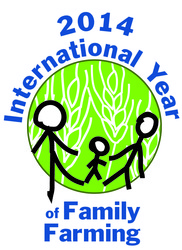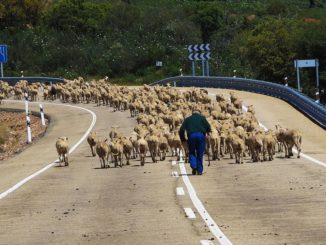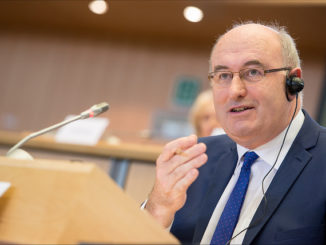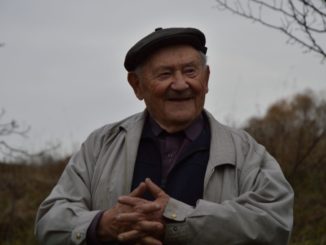 On the 29th of November Brussels was ready for a family farming celebration. Following the official launch of the 2014, International Year of Family Farming by the United Nations, the Directorate General for Agriculture and Rural Development of the European Commission organized the International Conference “Family farming: A Dialogue Towards more sustainable and resilient farming in Europe and the world”.
On the 29th of November Brussels was ready for a family farming celebration. Following the official launch of the 2014, International Year of Family Farming by the United Nations, the Directorate General for Agriculture and Rural Development of the European Commission organized the International Conference “Family farming: A Dialogue Towards more sustainable and resilient farming in Europe and the world”.
The conference brought together policy makers, civil society actors, farming associations and cooperatives but also corporations, agribusiness and industry representatives, in what seemed like a clash of two agricultural paradigms.
Dacian Ciolos, European Commissioner for Agriculture highlighted during his opening speech that there are 500 million family farmers all over the world feeding humanity, making up 80% of all farms. The Commissioner mentioned the multitude of contributions that family farming is bringing for the well being of humanity from the sustainable use of natural resources and biodiversity, resistance and adaptability to crises and contributing to the safeguarding of rich traditions, local identities and cultural heritage.
Commissioner Ciolos concluded that: “The U.N., F.A.O., W.T.O., G20 and other international bodies should play an active role to ensure that international policies on trade, the environment, the fight against climate change, fight against poverty, social development, work to enable small-holder agriculture to continue and grow”.
Also speaking at the Conference, U.N.’s Food and Agriculture Organization Director-General José Graziano da Silva stated that: “Family farmers have, over generations, preserved and perfected many practices and technologies that can support agricultural sustainability”, noting that farmers must not be seen as a problem but rather a part of the solution in ending hunger in developing countries and preserving the environment in a global context.
These were some uplifting speeches, but the corporate approach didn’t miss its opportunity to exploit the moment. Global food and household care products company, Unilever, also delivered its social responsibility viewpoint, committing to “improve the livelihoods of 500.000 family farms” while highlighting the “sustainability” of their bouillon cubes and ice cream. However, the company omitted to report how Wilmar Group, it’s palm oil supplier is violently grabbing the land of small farmers in Sumatra and Borneo, also leveling rain-forests to make way for oil palm plantations. All this for soap and margarine.
The words “family farmer” were on all lips. But what are family farms? Confusion arose as speakers mentioned about family farms and family owned farms, basically either talking about small farms or just the legal status of a farm. Even if family farms operate at very different scales within the EU, one fact is for certain: small and medium-sized peasant farms are the economic and social backbone of European agriculture, with an average farm size of 14 ha, and over 69% of which under 5 ha, and just 2.7% over 100 ha.
Much of these farms are located in Eastern Europe, in countries like Romania, Poland or Bulgaria, and though the Common Agricultural Policy has changed, still, as the international peasants movement, Via Campesina, also highlights, policies are driving these farms out of existence in a pseudo-modern approach that is ill-adapted to the issues facing us in the 21st century and the global crisis that European people are confronting.
The workshops gave chance for more intense debate on different aspects of family farming from best practices, access to new technology and research, to organization models to strengthen family farms. COGECA President, Christian Pees, underlined the importance of agri-cooperatives in helping family farmers to better manage the extreme market volatility and enable them to get a better price for their produce.
Via Campesina highlighted the urgent need to encourage relocalisation of agricultural products and to introduce policies based on the principles of food sovereignty to support, maintain and increase economic and social sustainability of the peasant agriculture model. Representatives of the international peasant movement also stressed that land policies need to change in line with the directives validated by States in the Committee on World Food Security of the United Nations Food and Agriculture Organization.
According to the European Commission, the conference outcome will contribute to the FAO European Regional Conference scheduled for 1-4 April 2014 in Bucharest, Romania, and to events related to family farming that will be organized in the course of the next year.
The new Common Agricultural Policy has a slogan: “Taking care of our roots”. These roots are currently ramified through the millions of family farmers all over Europe. The grassroots message was clear: land, seeds and food should not be speculative commodities on volatile global markets. They consist the basic rights of smallholders all over the world and should be protected so that the future of family farming could be guaranteed beyond 2014.





